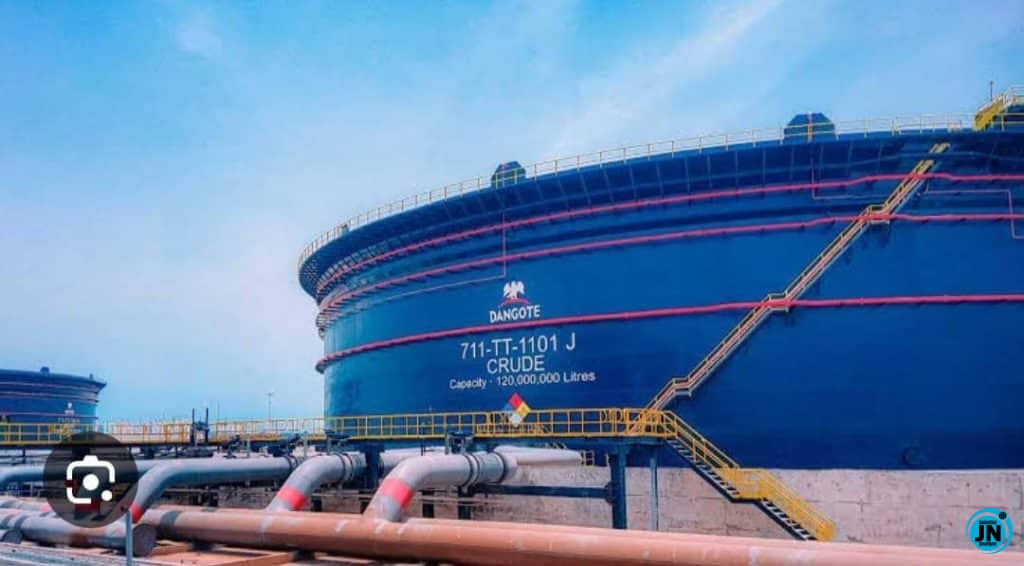Fuel prices in Nigeria may soon decrease following a new agreement between the Independent Petroleum Marketers Association of Nigeria (IPMAN) and the Dangote Petroleum Refinery.
Under this agreement, IPMAN will be able to lift products directly from the refinery, a move expected to make fuel more affordable for Nigerians.
The deal, which is seen as a significant step toward reducing fuel costs, was announced during a press briefing held in Abuja on Monday. IPMAN’s National President, Abubakar Garima, revealed that Dangote Refinery has now granted permission for the association to directly lift Premium Motor Spirit (PMS), Automotive Gas Oil (AGO), and Dual Purpose Kerosene (DPK) for distribution to IPMAN’s depots and retail outlets across the country. This initiative is expected to create a steady and reliable supply chain, which will ultimately lead to more affordable fuel prices for Nigerians nationwide. Garima emphasized that this agreement marks a new chapter in ensuring a continuous, unhindered supply of fuel products, which would help stabilize fuel costs across the country.
He further added, “Following our recent meeting with Alhaji Aliko Dangote and members of his top management staff in Lagos, we are happy to announce that Dangote Refinery has agreed to allow IPMAN to directly lift PMS, AGO, and DPK, with these products being supplied to IPMAN depots and retail outlets nationwide. This partnership with Dangote Refinery will certainly guarantee a regular and unbroken supply of fuel products, which will ultimately result in more affordable fuel prices for Nigerians.”
In an interview with Punch, Energy expert Kelvin Emmanuel explained that the agreement would also significantly cut costs that were previously incurred by the Nigerian National Petroleum Corporation (NNPCL). According to Emmanuel, by eliminating financing and margin costs, particularly the $28 per metric tonne that was passed to IPMAN, fuel prices can be reduced. IPMAN, which controls around 30,000 retail stations across Nigeria, stands to benefit greatly from this cost-saving measure, thus facilitating a reduction in fuel prices at the pump for consumers. Emmanuel described the agreement as a win for Nigerians, ensuring both affordability and access to fuel, which had been issues in the past.
Also weighing in on the development, the Executive Secretary of the Major Energy Marketers Association of Nigeria, Clement Isong, explained that the final landing price of fuel is determined by several key factors. These include the exchange rate, logistics efficiency, and the purchasing volume negotiated with suppliers. He stated that while there has been a noticeable 20.34 per cent decrease in the landing cost of petrol to N971.57 per litre, it is important to understand that the actual price at the pump may vary depending on certain factors. Isong emphasized that oil marketers typically set their prices based on the average cost of petrol imported within the last 30 days, rather than the daily spot price of crude oil. As a result, prices may fluctuate based on exchange rates and logistical efficiencies, with larger shipments benefiting from lower landing costs.
Isong clarified, “If you read our bulletin, there is not one landing price for the whole country. What we are saying is to give an idea of the landing price if you land 38,000 metric tonnes into ASBM in Apapa, this is the landing price. That’s what we are saying. If you land 100,000 MT, or 80,000 MT into Pinnacle, the landing price will be lower. But there are only two places where the landing price will be lower due to economies of scale. If you land in the majority of the country, the depots and facilities take less. So, if you land it into another place in Lagos, the landing price will be higher. It won’t be N971 per litre. It can be as close to N1,000.”
He further explained, “So, the landing price is a function of how much you got your exchange rate, logistics and your negotiating power based on what volume bought. Some marketers are landing below N917. But the vast majority of people who don’t enjoy the benefits of economies of scale will land at significantly above that. What this teaches is that it is a free and open market. It’s how you buy that you sell. There is no one price. It is a function of the draft of the vessels that you land the product. It’s a function of how much product was bought. It’s a function of what rate of exchange was used to buy products. The exchange rate that we have used is the central bank rate. So, if you have the central bank rate, then you will not land at that price but if you go to the black market, the price will be higher.”
In conclusion, Isong pointed out that the market price for fuel fluctuates based on the exchange rate, logistics, and the amount of product purchased. He explained that oil marketers use the central bank’s exchange rate for transactions and that the spot market’s daily fluctuation does not directly affect the price at the pump. Furthermore, he noted that the law permits oil marketers to keep only a 30-day supply of fuel in their depots, meaning that even if the spot market price goes up or down, marketers will still sell at a price based on the average cost of the fuel they have in stock.
The landmark deal between IPMAN and Dangote Refinery is expected to significantly reduce the cost of fuel for Nigerians, making it more affordable and accessible across the country. With the agreement in place, the price of fuel is set to become more stable, offering Nigerians much-needed relief in a country where fuel costs have long been a source of economic strain.


